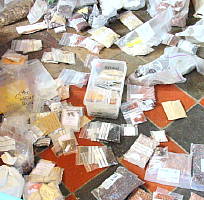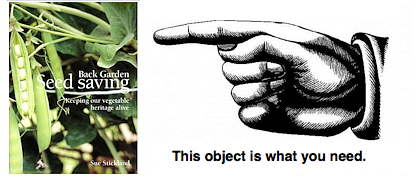How long will seeds last?
We get asked this a lot. The answer is - it depends. It depends on the seed, on the packaging, and the conditions the packets are stored in.
To start with, you have to realise that seeds are living things, they run out of stored energy over time and then die. You really will not get such good results if you forget to plant them and leave sowing them until the following year.
We need to be clear that we expect you to sow your seed in the same growing season you buy them in. We always test our seed before packing , and guarantee good germination as long as you sow them within a year of purchase.
But . . what if you have some left over?
Different species of vegetables have very different seed life, ranging from the Liscari Sativa which we only sell from harvest til the following spring, because by the summer the seed will be dead, through to melons, where some older gardeners swear by using 5 year or older seed because they believe it gives more fruit.
 The table below gives a very rough indication for the most common vegetables of potential seed life, if they start out really good and dry (not just room-dried)
The table below gives a very rough indication for the most common vegetables of potential seed life, if they start out really good and dry (not just room-dried)
Do be aware that the way in which seeds are stored will affect their life – the following times assume that the seeds have been stored somewhere cool, dry and dark. If seeds get damp or are kept in warm conditions they will keep significantly less well. You'll only reach the top end of the seed life shown below if the seeds are really dry and kept somewhere in an airtight sealed packet (not paper) that stays at a steady cool temperature. If you have an unheated under-the-stairs cupboard, then that's ideal as it will stay fairly constant in temperature throughout the year.
Also, germination is not an on/off state, what will generally happen is that as seeds get older the percentage that germinate will start to drop off, and then at some point will fall to zero.
LIFESPAN OF PROPERLY-DRIED SEED, YEARS FROM HARVEST:
Note if you've bought the seed, it's always well into its first year by the time it is tested, packed and sent out to you. So the upper figures will only ever apply to seed you have grown yourself and dried properly.
Type of vegetable |
Rough estimate of seed life |
Beans |
3 to 5 yrs + |
Beetroot, chard & leaf beet |
2 to 3 yrs |
Brassicas (broccoli, cabbage, kale, brussels, turnips etc) |
3 to 6 yrs |
Carrots |
up to 3 yrs |
Courgettes & squashes |
2 to 4 yrs |
Cucumbers & melons |
up to 10 yrs |
Lettuces |
2 to 5 yrs |
Onions/leeks/spring onions |
usually 1 year, |
Parsley |
2 to 3 yrs |
Parsnips |
2 yrs max |
Peas |
3 to 5 yrs + |
Peppers & aubergines |
usually 2 or 3 years, up to 5 sometimes |
Tomatoes |
up to 8 yrs , but most commonly 3 |
If do you have an old packet of seeds, and wonder whether they are worth sowing, you can always test their germination yourself.
Put a couple of layers of damp kitchen towel on a saucer, sprinkle a few seeds on it, and wrap it loosely in a plastic bag (so that it stays damp but is not airtight). Put the saucer somewhere warm - an airing cupboard is ideal – and check after a few days. If your test seeds have germinated, then you are fine to go ahead and sow the rest, sowing more thickly if only a proportion of them grew. If nothing is happening, then you need new seeds.
Please, don't try to buy
a survival-stash of seed
for the zombie apocalypse !
 The other thing that we continue to see any time there is a crisis is people who come to us worried about social breakdown and who want to buy large amounts of seed to store 'for an emergency'. But this really doesn't make sense! Yes, we know there are lots of websites out there selling 'survival seed packs' but to be honest, they are just preying on people's fears, and its really not a good use of your money at all.
The other thing that we continue to see any time there is a crisis is people who come to us worried about social breakdown and who want to buy large amounts of seed to store 'for an emergency'. But this really doesn't make sense! Yes, we know there are lots of websites out there selling 'survival seed packs' but to be honest, they are just preying on people's fears, and its really not a good use of your money at all.
Firstly, seeds are best sown fresh. Even stored in a fridge or freezer, the germination percentage and vigour will reduce over time, often quite quickly.
More importantly, suppose you do find you're in a nightmare situation where you suddenly need to grow your own food - it will be too late to start learning then! Even as an experienced gardener it can take several years to clear a new plot and make it properly productive.
And its not just growing the food, you'll need to learn to save the seed, and store the veg overwinter. All take several years experience. So if tempted by one of these 'survival packs', just picture yourself hungry, standing there in front of your powerless defrosting freezer , with your now-out-of-date seeds in your hand. How exactly does that help you?
So, our view is this: Yes, we are living through a time of crisis. Yes, the current food supply chain is really fragile and our economic situation precarious. And yes, it is outrageously unfair that our schools and hospitals are closed and privatised while the 1% continue to prosper.
But if you are worried about the future, just stashing seeds away really won't help you. The best thing to do is to work on your garden now - and get really good at growing vegetables on your plot and making the most of the space that you have. Learn about growing for the hungry gap, and learn ways of storing your summer harvest gluts without electricity overwinter.
Even better, learn how to save your own seeds for future years. Think about starting a seed circle with your friends, or joining a local community seed library if there's one in your area (or starting one if there isn't). Perhaps your new skills won't ever be needed, but even so, you'll have had fun learning, and not lost anything.
The alternative, of just buying a pouch of seeds and bunging them in the freezer, is of course much easier, but will actually achieve nothing, other than enriching some doom-mongering seed seller somewhere.
There's lots of information on how to save seed on our website here, plus we also sell (at a reduced price) Sue Stickland's book Back Garden Seedsaving, which will tell you all you could ever need to know about seedsaving.
PS. This is a slightly revised version of a text that we first wrote around the time of the 2008 financial crash. In March 2020, when the world was going crazy for seeds and we couldn't possibly keep up with demand, one bright spot for us was the number of our customers who contacted us to say that they HAD been saving their own seeds for lots of crops, and were sharing them with their friends and neighbours.






